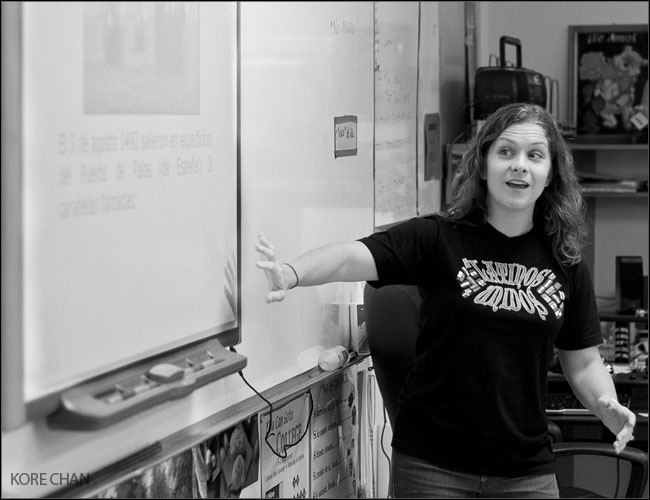
Aragon’s technological advancements have changed learning and teaching on a whole new level. In some ways, they help and enhance teachers’ abilities to educate their students, while in other ways, they might affect or limit student’s abilities.
PE and Health teacher Ed Larios says, “When I started teaching, the only types of technology were electric typewriters, ditto machines, and xerox copy machines.”
Much has advanced and teachers often find these new resources helpful. “When I think of how much has changed in 15 years, I am astounded. Attendance, communicating with parents, entering and posting grades has become so much easier,” says English teacher Victoria Daniel.
Avid substitute teacher Sherri Maurin agrees and says, “I go on Microsoft word documents to project a much clearer image for the students. Sometimes they say [that they] can’t read [my] writing so it’s clearer when things are typed and projected.”
Some students also express positive opinions on the new technology. Freshman Katherine Goldin says, “I find [the new technology] helpful because [Smart Boards] give more visuals than a teacher lecture. It helps me learn because if I see things, I hang on to them more.”
Sophomore Audelina Martinez says, “For some teachers, we have to type [assignments] and it’s easier to have a computer at home instead of having to go to the library and other places.”
Although technology seems to be beneficial for a lot of our peers, they also bring up unhelpful things such as distractions. Freshman David Tong says, “I go on Facebook like every two minutes. It makes my homework take twice as long, like six hours. Sometimes I finish and sometimes I don’t and I have to finish it in class.”
Goldin says, “When you’re doing homework and you get a text, the phone goes off, and you just want to answer it.”
Teachers are well aware of the technological distractions that their students face daily. They seem to be more concerned about how technology may be affecting their students’ learning abilities. Spanish teacher Luisa Hardy explains how her students seem to be losing their “critical thinking.” “When I was in high school we really had to do research. We had to rely on different sources, go to magazines, go to books, go to newspaper articles. Now you can just go on Google or Wikipedia and find everything you need to know very quickly and I feel you’re losing a little bit of the thinking process that takes place when you search or research for something so effortlessly,” she says.
Maurin also emphasizes the skills that are diminished in our age of technology. “The basic skills of how to spell and the basic skills of how to do math [are lost],” she says. “There’s an interdependency that without the electronics, there isn’t an easy ability to do simple things without the technology.”
Even students are aware of these unhealthy affects. “When you’re using the computer basically the computer does the work and you just put in your ideas,” says freshman Susan Rodriguez.
These opinions and observations from our Aragon community come to show that technology affects us in good ways and in bad. “[Technology] helps give us access to information and images we might never have,” says Daniel. “It can expand knowledge and communication in ways we never could before. I think [technology] may make it more engaging [for students], but easier, no. [Students] still have to think and process on their own and the best learning, that which occurs through social interaction, conversation, and hands-on experimenting, can not be done with technology.”
Technology is a great tool- a tool that is used for access to information and communication. It could never be a tool for your ability to think, it will never think for you.
It’s the people using the technology who decide whether it is the good or bad guy.




